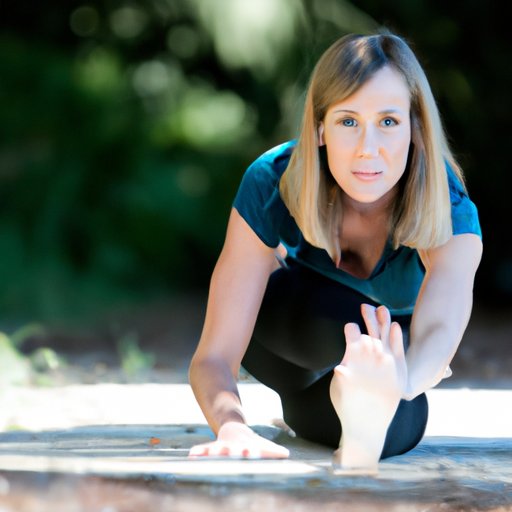Introduction
A healthy lifestyle is defined as having an overall sense of well-being, both physically and mentally. It is about more than just eating right and exercising; it’s also about developing good habits, fostering positive attitudes, and taking care of your mental health. In this article, we will explore the different aspects of leading a healthy lifestyle and discuss the benefits of doing so.
Analyzing the Benefits of Eating a Healthy Diet
Eating a balanced and nutritious diet is essential for optimal health. Every person has unique nutritional requirements, depending on their age, gender, and activity level. However, there are certain basic guidelines that can be followed for overall wellness.
The benefits of eating fresh, unprocessed foods cannot be understated. Fresh fruits and vegetables are packed with essential vitamins, minerals, and antioxidants. Eating a variety of these foods will help provide the body with the nutrients it needs for proper functioning. Additionally, whole grains, lean proteins, healthy fats, and dairy products should be included in a healthy diet.
Incorporating a wide range of colorful fruits and vegetables into meals is also beneficial. Fruits and vegetables are rich sources of fiber, vitamins, and minerals. Eating them can help reduce the risk of chronic disease and improve overall health.

Exploring Exercise Routines for Optimal Health
Regular physical activity is important for maintaining good health and preventing disease. Different types of exercise are recommended for different age groups, but some general guidelines can be followed. For adults, at least 150 minutes of moderate-intensity aerobic activity per week is recommended. This could include walking, jogging, swimming, or cycling. Strength training exercises should also be included to build muscle mass and bone density.
Exercising regularly has many benefits, such as improving cardiovascular health, reducing stress levels, and promoting weight loss. Additionally, it can help boost energy levels, improve sleep quality, and increase self-confidence.
Incorporating physical activity into daily routines can be challenging, especially if you have a busy lifestyle. Some tips for making exercise part of your routine include setting realistic goals, taking breaks during the day to move around, and finding activities that you enjoy.
Investigating Natural Ways to Improve Mental Wellbeing
Mental health is an important component of overall wellbeing. Regularly practicing stress management techniques, mindfulness exercises, and meditation can help reduce anxiety and depression, improve concentration, and promote emotional resilience.
Stress management techniques such as deep breathing, progressive muscle relaxation, and yoga can help reduce tension and restore balance. Mindfulness exercises can help cultivate awareness of thoughts and feelings, allowing us to respond to situations in healthier ways. Meditation can help us to become more present and mindful in our lives.
These practices can also help to decrease symptoms of mental health disorders and improve overall wellbeing. They can be incorporated into daily routines to help manage stress and foster a sense of inner peace.
Examining the Role of Sleep in Sustaining Good Health
Getting enough sleep is necessary for sustaining good health. Most adults need between seven and nine hours of sleep each night. Sleeping too little or too much can have negative effects on physical and mental health.
Adequate sleep helps to support immunity, cognition, and mood. It also reduces the risk of obesity, diabetes, and heart disease. Getting enough rest is essential for maintaining energy levels and feeling alert during the day.
If you’re having trouble sleeping, there are several strategies you can try. Creating a soothing bedtime routine, avoiding caffeine and alcohol close to bedtime, and limiting screen time before bed can all help to improve sleep quality. Additionally, exercise and relaxation techniques can help to reduce stress and make it easier to fall asleep.

Discussing Habits that Promote Overall Wellness
In addition to eating well and exercising regularly, there are other habits that can be developed to promote overall wellness. Having a positive attitude, engaging in self-care activities, and spending time with family and friends are all important for sustaining good mental health.
Fostering a positive outlook on life can help to reduce stress and lift moods. Taking time for yourself to do something that makes you happy, whether it’s reading a book, taking a bath, or going for a walk, can also help to improve mood and reduce anxiety. Connecting with others, and building a strong social network, is also important for mental wellbeing.
Making time for recreation and fun is also essential for a healthy lifestyle. Engaging in hobbies, playing sports, going on vacation, and exploring new places can all help to reduce stress and promote a sense of joy and contentment.

Examining the Impact of Stress on Physical Health
Chronic stress can have serious consequences on physical health. It can weaken the immune system, making people more susceptible to illnesses such as colds and flu. It can also increase the risk of high blood pressure, heart disease, and stroke. Additionally, stress can cause headaches, digestive issues, and fatigue.
It is important to take steps to reduce stress levels. Practicing relaxation techniques such as deep breathing, meditation, and yoga can help to reduce tension and promote a sense of calm. Additionally, talking to a friend, engaging in hobbies, and getting regular exercise can also help to reduce stress and improve physical health.
Conclusion
Leading a healthy lifestyle involves more than just eating right and exercising. It also includes developing good habits, cultivating a positive attitude, and taking care of your mental health. Eating a nutritious diet, incorporating physical activity into daily routines, managing stress, and practicing self-care are all important for achieving overall wellbeing. Adopting these habits can have numerous benefits, from improved physical health to increased happiness and contentment.
(Note: Is this article not meeting your expectations? Do you have knowledge or insights to share? Unlock new opportunities and expand your reach by joining our authors team. Click Registration to join us and share your expertise with our readers.)
